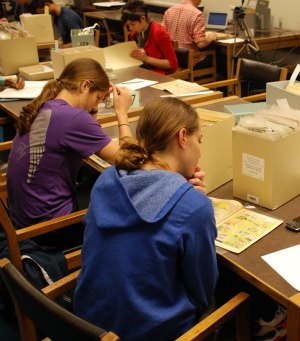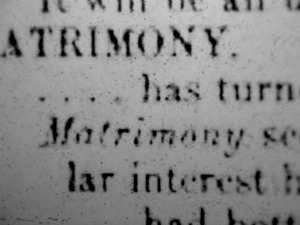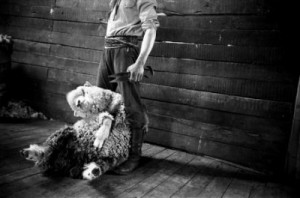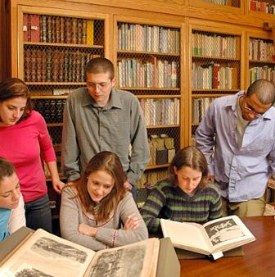Time to get cracking on those final papers? Start your research with one of the collections described in these brand-new finding aids!
African American Miscellany, 1757-1983
This collection of approximately 400 print and manuscript items relating to African and African American history was assembled over a number of decades by the staff of the RBMSCL. These documents—largely from the southern United States—speak to the sales, escapes, and emancipations of slaves from colonial times through the Civil War, the civil rights era from 1950-1970, and to a lesser extent, the period in between the 1870s and the 1950s.
South Africa Documentary Photographs Collection, 1940s-2007 and undated
Acquired as part of the Archive of Documentary Arts, the South Africa Documentary Photographs Collection consists of four series of photographs documenting South African social conditions under and after apartheid, dating from approximately the 1940s-2007: Beyond the Barricades, The Cordoned Heart, Then and Now, and Underexposed. Each series originated in an exhibition, book, or project developed jointly by Duke University and South African institutions. The collection represents work by 45 South African photographers, many of whom were members of Afrapix, a collective photography agency that was politically active in the 1980s, or were otherwise active in documenting anti-apartheid struggle.
Louanne Watley Photographs, 2002-2010
The photographs and supporting materials created by Louanne Watley depict communities of Catholic nuns in Indiana, Kentucky, North Carolina, and Virginia, and images of their religious life in those communities. She typically focuses on the women’s individual faces, hands, and feet. There are also a few images of monks and their communities as well. The formats are primarily black-and-white prints with some color prints, contact prints, Polaroids (diffusion transfer process), large color inkjet prints, and negatives. As with many Archive of Documentary Arts collections acquired in recent years, digital scans of Watley’s work are also included.
Walter McGowan Upchurch Papers, 1841-1977
Walter McGowan Upchurch, Jr. served as a member of Duke’s Board of Trustees and was senior vice-president of Shell Companies Foundation, Inc. This collection contains personal correspondence among members of the Upchurch family, including correspondence between Upchurch and his brother during World War II, when they were both serving in the U.S. Navy; professional correspondence concerning Duke University administrative affairs; and genealogical materials for the Upchurch, Daniel, and Meadows families of North Carolina. Additional materials include Shell Development Company records on personnel issues such as labor relations and salary administration at the progressive Emeryville Laboratories; and Shell Companies Foundation records from 1963 to 1974, chiefly relating to the foundation’s endowments, scholarships, grants, and donations. The Duke University Archives also holds a smaller collection of Upchurch’s papers.
Please remember that many RBMSCL collections are stored off-site in our wonderful Library Service Center and need to be requested by RBMSCL staff members at least 24 hours before your research visit. We encourage you to e-mail special-collections(at)duke.edu for assistance.












